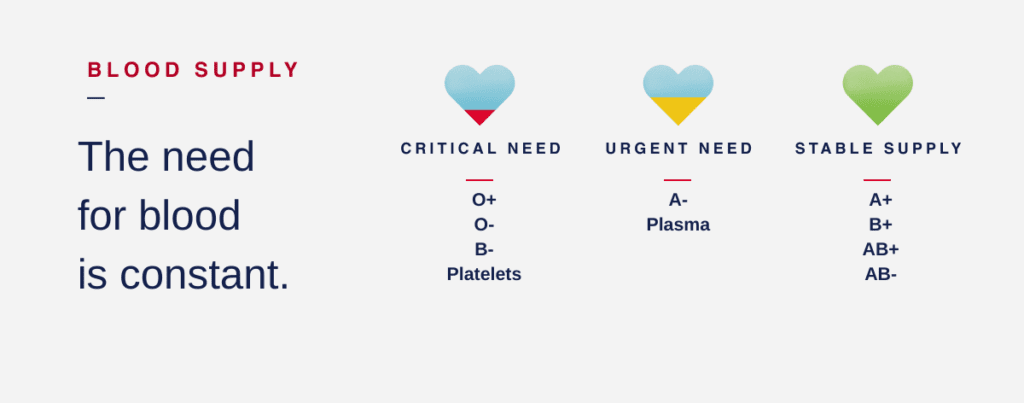Blood Supply

Take a look at your community blood supply
The need for blood never ends, but the available amount can change from day to day.
Blood transfusion is one of the most frequently performed procedures in hospitals; one in seven hospital patients will require blood during their stay. These Texans in need include cancer patients, mothers experiencing difficult childbirths, children with anemia, older adults with health issues, trauma and surgical patients, and many others.
To illustrate this demand, Carter BloodCare maintains a community blood supply graph to highlight Critical, Urgent and Stable needs:
Critical (less than 1-day’s supply is available)
This red-level status is the most serious situation for our community. It indicates the community blood supply is critically low and donations of the blood types listed are needed now.
Under Critical conditions, a loved one who requires a transfusion may not receive blood for an extended period of time.
Urgent (2-day supply is available)
This yellow level indicates the local blood supply is running low and blood donations are urgently needed.
When blood needs are Urgent, a loved one may experience a delay of one to two days in receiving blood for transfusion.
Stable (4-day supply is available)
Green indicates a stable supply, meaning there is enough blood available to meet everyday operating demands.
When the supply is Stable, a loved one should receive a transfusion as scheduled.
Whether the community blood supply is in red, yellow or green status, there is only one solution to keep up with demand: a collective, consistent effort by all eligible people to give blood.
There are many ways you can help build a readily available blood supply for local patients:
- Donate blood when you are eligible.
- Donate blood more than once a year. If you donate whole blood, you can give every 56 days, or up to six times in one year. If you donate platelets, you can donate every two weeks, or as many as 24 times per year.
- Maximize your donation and affect twice as many patients’ lives. Learn more about double red cell donations.
- Share why you give blood and invite new donors, including friends, family, neighbors, co-workers and anyone who may be eligible to make a lifesaving difference.
- Host a blood drive at your workplace or place of worship by emailing bookablooddrive@carterbloodcare.org.
Potential blood donors may donate at age 16 with parental consent; 17-year-olds can give independently. There is no upper age limit.
To reduce wait times, donors can complete the donor history questionnaire online on the day of donation, before arriving to donate blood.
A list of Carter BloodCare’s neighborhood donor centers is available online. Through this same link, visitors can use the left-hand navigation to also find local mobile drives by city, county, ZIP code or regional map.
To schedule your next blood donation this month, call or text 800-366-2834.
Para información en español llama: 844-372-5827.
